The marketing world is on the cusp of a digital revolution, with artificial intelligence (AI) stepping into the spotlight. Influencer marketing, a trend that has dominated social media and shaped consumer behavior, is evolving in an unprecedented way. AI-generated avatars, equipped with the ability to mimic human experiences, are carving a niche for themselves in this space. A recent survey by HubSpot indicates that a staggering 89% of marketers who currently engage with influencer marketing plan to increase or maintain their investment next year. As we venture deeper into 2023, we are left to ponder: Will the future of influencer marketing pivot towards bespoke AI personalities, tailor-made to individual consumer preferences?
The Emergence of AI Personalities in Influencer Marketing
AI influencers are digital personas that exist on social media platforms, much like their human counterparts. However, these virtual figures are powered by advanced algorithms that analyze data to create content that resonates with specific audiences. With the ability to post, interact, and even “live” online, these AI personalities are blurring the lines between reality and virtuality. They offer brands the opportunity to engage with consumers in new and innovative ways.
The Human Touch: How AI Influencers Mimic Real Experiences
AI influencers are not just static avatars; they are crafted to embody human-like qualities, thanks to sophisticated machine learning techniques. These digital entities can tell stories, showcase emotions, and even endorse products with a level of authenticity that rivals that of human influencers. By analyzing social media trends and user interactions, AI personalities can adapt their content to reflect the changing preferences and interests of their audience.
The Stats That Matter: AI Influencers in the Marketing Mainstream
The numbers speak volumes about the potential of AI in influencer marketing. With 89% of marketers poised to ramp up their influencer marketing budgets, it’s clear that the industry is ripe for innovation. AI personalities offer an attractive proposition: they are always on-brand, not susceptible to human error, and can operate around the clock. The scalability and control they provide are unmatched, making them a lucrative option for brands looking to make a lasting impact.
The Personalization Paradigm: Catering to Individual Preferences
In a world where personalization reigns supreme, AI influencers are set to become the ultimate marketing tool. Imagine a digital personality that not only appeals to a broad audience but also understands and caters to your unique tastes and interests. As AI and algorithms grow more symbiotic, the possibility of having a personal AI influencer – one that aligns perfectly with your preferences – becomes more tangible. This hyper-personalized approach could redefine consumer engagement, offering a marketing experience like no other.
The Ethical Considerations: Transparency in the Age of AI
As AI becomes increasingly integrated into marketing strategies, questions of ethics and transparency arise. It’s essential for brands to maintain clarity about the nature of their AI influencers, ensuring that consumers can distinguish between human-generated and AI-generated content. Establishing trust and authenticity, even in the realm of AI, is crucial for long-term success.
AI influencer marketing represents a fascinating intersection of technology and human experience. With its ability to customize content to an individual’s unique personality, it promises to reshape the influencer landscape dramatically. As algorithms become more advanced and AI personalities more nuanced, we may soon find ourselves interacting with digital entities that know us better than we know ourselves. The future of influencer marketing is not just about reaching audiences; it’s about connecting with them on a deeply personal level.
